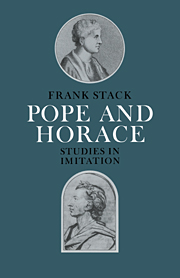Book contents
- Frontmatter
- Contents
- Acknowledgements
- List of abbreviations
- Preface
- PART I INTRODUCTIONS
- PART II THREE HORATIAN SATIRES (1733–4)
- PART III MATURE HORACE (1736–7)
- PART IV THE TIME OF TENSION (1738)
- 9 Idealism and scepticism: The Imitation of Epistle I.vi.
- 10 Fables of the self: The Imitations of Satire II.vi. and Epistle I.vii.
- 11 The Stoic self: The Imitation of Epistle I.i.
- Epilogue
- Appendix: Imitations of Horace published 1730–40
- Notes
- Bibliography
- Index
9 - Idealism and scepticism: The Imitation of Epistle I.vi.
Published online by Cambridge University Press: 08 January 2010
- Frontmatter
- Contents
- Acknowledgements
- List of abbreviations
- Preface
- PART I INTRODUCTIONS
- PART II THREE HORATIAN SATIRES (1733–4)
- PART III MATURE HORACE (1736–7)
- PART IV THE TIME OF TENSION (1738)
- 9 Idealism and scepticism: The Imitation of Epistle I.vi.
- 10 Fables of the self: The Imitations of Satire II.vi. and Epistle I.vii.
- 11 The Stoic self: The Imitation of Epistle I.i.
- Epilogue
- Appendix: Imitations of Horace published 1730–40
- Notes
- Bibliography
- Index
Summary
Every valuable, every pleasant thing is sunk in an ocean of avarice and corruption. The son of a first minister is a proper match for a daughter of late South Sea director, – so money upon money increases, copulates, and multiplies, and guineas beget guineas in saecula saeculorum.
O cives, cives! quaerenda pecunia primum est Virtus post nummos.
My body is sick, my soul is troubled, my pockets are empty, my time is lost, my trees are withered, my grass is burned! So ends my history.
Pope to Broome, 14 July 1723After the masterful achievement of the Epistle to Augustus we move into a very different world for Pope's last two complete Imitations of Horace which came out in the winter of 1738 – the Imitations of Epistle I.vi. and Epistle I.i. If the Epistle to Augustus shows what richness of thought can be achieved in the calm of retreat, these poems reveal what powerful tensions are produced by vigorous involvement in the world. We find in these Imitations new stresses in attitude and commitment, a darker view of society, a deeper scepticism, and a much more disturbed and troubled poetry of self-portraiture.
These changes are certainly due partly to the political climate of the winter of 1737–8. With the death of Queen Caroline in the autumn of 1737, and growing dissatisfaction with the government's peace policies, Walpole's position was weaker than it had ever been. The Opposition saw its chance and rallied itself for a concerted attack on him in Parliament, led by Carteret, Pulteney, Wyndham and Barnard. The drive gained momentum throughout the winter and then failed disastrously in May.
- Type
- Chapter
- Information
- Pope and HoraceStudies in Imitation, pp. 201 - 221Publisher: Cambridge University PressPrint publication year: 1985

